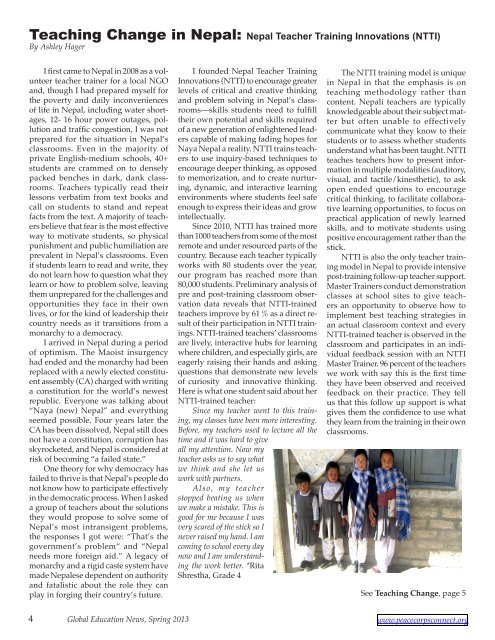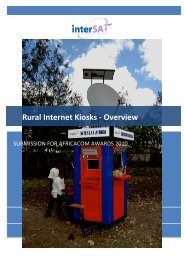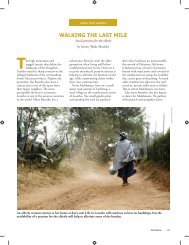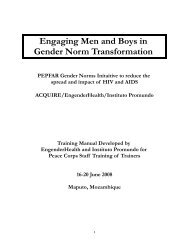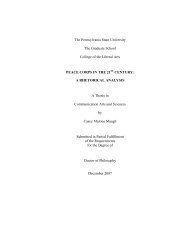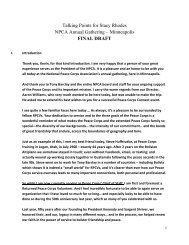Spring - National Peace Corps Association
Spring - National Peace Corps Association
Spring - National Peace Corps Association
Create successful ePaper yourself
Turn your PDF publications into a flip-book with our unique Google optimized e-Paper software.
Teaching Change in Nepal: Nepal Teacher Training Innovations (NTTI)<br />
By Ashley Hager<br />
I first came to Nepal in 2008 as a volunteer<br />
teacher trainer for a local NGO<br />
and, though I had prepared myself for<br />
the poverty and daily inconveniences<br />
of life in Nepal, including water shortages,<br />
12- 16 hour power outages, pollution<br />
and traffic congestion, I was not<br />
prepared for the situation in Nepal’s<br />
classrooms. Even in the majority of<br />
private English-medium schools, 40+<br />
students are crammed on to densely<br />
packed benches in dark, dank classrooms.<br />
Teachers typically read their<br />
lessons verbatim from text books and<br />
call on students to stand and repeat<br />
facts from the text. A majority of teachers<br />
believe that fear is the most effective<br />
way to motivate students, so physical<br />
punishment and public humiliation are<br />
prevalent in Nepal’s classrooms. Even<br />
if students learn to read and write, they<br />
do not learn how to question what they<br />
learn or how to problem solve, leaving<br />
them unprepared for the challenges and<br />
opportunities they face in their own<br />
lives, or for the kind of leadership their<br />
country needs as it transitions from a<br />
monarchy to a democracy.<br />
I arrived in Nepal during a period<br />
of optimism. The Maoist insurgency<br />
had ended and the monarchy had been<br />
replaced with a newly elected constituent<br />
assembly (CA) charged with writing<br />
a constitution for the world’s newest<br />
republic. Everyone was talking about<br />
“Naya (new) Nepal” and everything<br />
seemed possible. Four years later the<br />
CA has been dissolved, Nepal still does<br />
not have a constitution, corruption has<br />
skyrocketed, and Nepal is considered at<br />
risk of becoming “a failed state.”<br />
One theory for why democracy has<br />
failed to thrive is that Nepal’s people do<br />
not know how to participate effectively<br />
in the democratic process. When I asked<br />
a group of teachers about the solutions<br />
they would propose to solve some of<br />
Nepal’s most intransigent problems,<br />
the responses I got were: “That’s the<br />
government’s problem“ and “Nepal<br />
needs more foreign aid.” A legacy of<br />
monarchy and a rigid caste system have<br />
made Nepalese dependent on authority<br />
and fatalistic about the role they can<br />
play in forging their country’s future.<br />
I founded Nepal Teacher Training<br />
Innovations (NTTI) to encourage greater<br />
levels of critical and creative thinking<br />
and problem solving in Nepal’s classrooms—skills<br />
students need to fulfill<br />
their own potential and skills required<br />
of a new generation of enlightened leaders<br />
capable of making fading hopes for<br />
Naya Nepal a reality. NTTI trains teachers<br />
to use inquiry-based techniques to<br />
encourage deeper thinking, as opposed<br />
to memorization, and to create nurturing,<br />
dynamic, and interactive learning<br />
environments where students feel safe<br />
enough to express their ideas and grow<br />
intellectually.<br />
Since 2010, NTTI has trained more<br />
than 1000 teachers from some of the most<br />
remote and under resourced parts of the<br />
country. Because each teacher typically<br />
works with 80 students over the year,<br />
our program has reached more than<br />
80,000 students. Preliminary analysis of<br />
pre and post-training classroom observation<br />
data reveals that NTTI-trained<br />
teachers improve by 61 % as a direct result<br />
of their participation in NTTI trainings.<br />
NTTI-trained teachers’ classrooms<br />
are lively, interactive hubs for learning<br />
where children, and especially girls, are<br />
eagerly raising their hands and asking<br />
questions that demonstrate new levels<br />
of curiosity and innovative thinking.<br />
Here is what one student said about her<br />
NTTI-trained teacher:<br />
Since my teacher went to this training,<br />
my classes have been more interesting.<br />
Before, my teachers used to lecture all the<br />
time and it was hard to give<br />
all my attention. Now my<br />
teacher asks us to say what<br />
we think and she let us<br />
work with partners.<br />
Also, my teacher<br />
stopped beating us when<br />
we make a mistake. This is<br />
good for me because I was<br />
very scared of the stick so I<br />
never raised my hand. I am<br />
coming to school every day<br />
now and I am understanding<br />
the work better. *Rita<br />
Shrestha, Grade 4<br />
The NTTI training model is unique<br />
in Nepal in that the emphasis is on<br />
teaching methodology rather than<br />
content. Nepali teachers are typically<br />
knowledgeable about their subject matter<br />
but often unable to effectively<br />
communicate what they know to their<br />
students or to assess whether students<br />
understand what has been taught. NTTI<br />
teaches teachers how to present information<br />
in multiple modalities (auditory,<br />
visual, and tactile/kinesthetic), to ask<br />
open ended questions to encourage<br />
critical thinking, to facilitate collaborative<br />
learning opportunities, to focus on<br />
practical application of newly learned<br />
skills, and to motivate students using<br />
positive encouragement rather than the<br />
stick.<br />
NTTI is also the only teacher training<br />
model in Nepal to provide intensive<br />
post-training follow-up teacher support.<br />
Master Trainers conduct demonstration<br />
classes at school sites to give teachers<br />
an opportunity to observe how to<br />
implement best teaching strategies in<br />
an actual classroom context and every<br />
NTTI-trained teacher is observed in the<br />
classroom and participates in an individual<br />
feedback session with an NTTI<br />
Master Trainer. 96 percent of the teachers<br />
we work with say this is the first time<br />
they have been observed and received<br />
feedback on their practice. They tell<br />
us that this follow up support is what<br />
gives them the confidence to use what<br />
they learn from the training in their own<br />
classrooms.<br />
See Teaching Change, page 5<br />
4 Global Education News, <strong>Spring</strong> 2013 www.peacecorpsconnect.org


